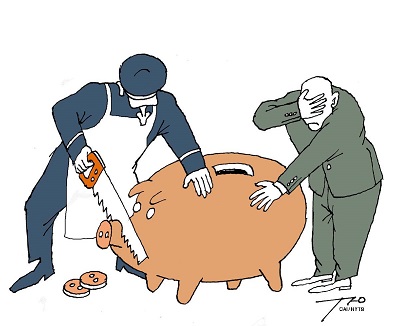
A genuinely interesting debate on financial reform is taking place. I’m not even sure where I stand. But it’s certainly worth talking about.
On their blog, the economists Atif Mian and Amir Sufi drew attention to proposals to either mandate or create strong incentives for 100-percent reserve banking, coming from the Financial Times columnist Martin Wolf and, more surprisingly, from John Cochrane, a professor at the University of Chicago. Equally surprising – at least to me – is that Mr. Cochrane seems to be more aware of the difficulties of the issue.
The basic idea both writers share is that banks as we know them – institutions that issue promises to pay money on, or almost on, demand, while holding liquid assets that cover only a fraction of that potential demand – are inherently subject to runs, self-fulfilling losses of confidence. So they propose that we try to eliminate such institutions; there would still be things we call banks, but they would simply be custodians of government-issued liquid assets.
Mr. Wolf, unless I’m reading him wrong, seems to identify the whole issue with one particular form of short-term debt – bank deposits.
This seems an oddly narrow view given the nature of the 2008 crisis, which involved very few runs on deposits, but a massive run on shadow banking, especially repo – overnight lending that in a fundamental sense fulfilled the functions of deposit banking but also created the same kinds of risks. Mr. Cochrane gets this, and calls for a “Pigouvian tax” – i.e., the kind of tax economics textbooks tell us we should have on pollution – imposed on any form of “run-prone short-term debt.”
So, three thoughts.
First, Mr. Wolf’s omission is a big one. If we impose 100 percent reserve requirements on depository institutions, but stop there, we’ll just drive even more finance into shadow banking, and make the system even riskier.
Second, Mr. Cochrane’s proposal calls for a remarkable amount of government intervention in finance; it makes liberal proposals for a transactions tax look like minor nuisances in comparison. Cochrane insists that we can easily run our economy without dangerous short-term private debt – that we can easily set things up so that the manager of your index fund sells a tiny piece of your stock portfolio every time you use a debit card at 7-Eleven. Is this right?
Third, and on a quite different note: Are we really sure that banking problems are the whole story on what went wrong? I’ve made this point before, but when you look at any measure of financial stress, what you see is a huge peak in 2008 that quickly went down. Yet the quick return to normality in financial markets (achieved, to be sure, through bailouts and guarantees) did not produce a quick recovery in the real economy; on the contrary, the U.S. economy is still depressed, and many advanced countries are now on the edge of deflation, more than five years later.
This strongly suggests that while bank runs may have brought things to a head, the problems ran deeper; in particular, I’m strongly of the view (based in part on Mr. Mian and Mr. Sufi’s work) that broader issues of excess leverage, and the resulting balance-sheet problems of many households, were key. And neither 100 percent reserves nor a repo tax would have addressed that kind of leverage.
One small footnote: Mr. Cochrane has argued that people who really believe in Keynesian remedies shouldn’t care about the soundness of banks, because the government can always offset the effects of a banking crisis with stimulus measures. There are multiple reasons why that isn’t right – among other things, people like me may argue that the dangers of government debt are exaggerated, but we’d still rather not have to engage in large-scale deficit spending on a regular basis.
But the main point, surely, is that what stimulus could do and what it will do aren’t at all the same thing. What we’ve discovered over the past five years is that even under conditions that make an overwhelming case for government policies to boost demand, half the economics profession and a majority of policy makers will find reasons to do exactly the wrong thing. This argues for precautionary policies to avoid getting into such situations if possible.